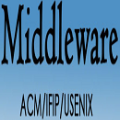As quantum hardware continues to scale, managing the heterogeneity of resources and applications -- spanning diverse quantum and classical hardware and software frameworks -- becomes increasingly critical. Pilot-Quantum addresses these challenges as a middleware designed to provide unified application-level management of resources and workloads across hybrid quantum-classical environments. It is built on a rigorous analysis of existing quantum middleware systems and application execution patterns. It implements the Pilot Abstraction conceptual model, originally developed for HPC, to manage resources, workloads, and tasks. It is designed for quantum applications that rely on task parallelism, including: (i) Hybrid algorithms, such as variational approaches, and (ii) Circuit cutting systems, used to partition and execute large quantum circuits. Pilot-Quantum facilitates seamless integration of quantum processing units (QPUs), classical CPUs, and GPUs, while supporting high-level programming frameworks like Qiskit and Pennylane. This enables users to design and execute hybrid workflows across diverse computing resources efficiently. The capabilities of Pilot-Quantum are demonstrated through mini-applications -- simplified yet representative kernels focusing on critical performance bottlenecks. We present several mini-apps, including circuit execution across hardware and simulator platforms (e.g., IBM's Eagle QPU), distributed state vector simulation, circuit cutting, and quantum machine learning workflows, demonstrating significant scale (e.g., a 41-qubit simulation on 256 GPUs) and speedups (e.g., 15x for QML, 3.5x for circuit cutting).
翻译:暂无翻译




